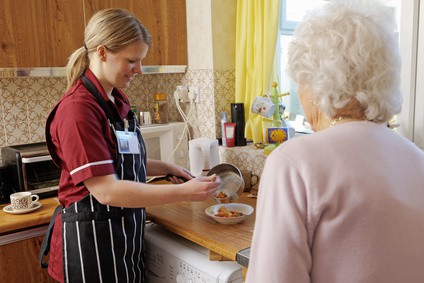How seniors’ diets change with age
Posted by Steve Jones
Sun, Sep 6, 2015
As our friends and family members age, it becomes more and more important for them to watch their diet. Certain nutritional needs change as people get older and there are steps that we can take to help our older friends and relatives at mealtimes. Following the Canadian Food Guide is a good first step to keeping a balanced diet. Here are some things to watch for when youre thinking about an aging relatives nutrition.

Changes in Appetite
Weve all experienced changes in our appetite at one point or another. It might be mealtime but you just dont feel hungry. As people age, this can become more common. Sometimes an older relative may not show interest in eating at all. Some possible reasons for this include not being able to cook for themselves anymore, pain when chewing or swallowing, and unhappiness associated with eating alone.
Its important to identify the reasons for their changes in appetite before trying to remedy the situation. Some issues, like depression or mouth pain are more serious and require medical attention. Other issues, like if your relative doesnt eat particular meals because they dont like the taste, are easier to fix. Talk with your relative about what their reasons are for losing their appetite. If cooking different meals is the solution, work with them to pick a menu that works. If you’re worried about their health, visit a doctor.

Changes in Weight
Our metabolisms get slower as we age, and it takes longer for people to digest food. Though this process is natural, there are ways to prevent significant weight gain in old age. Here are some quick tips to help avoid those extra pounds.
- Stick to a balanced diet
- Exercise regularly
- Eat just enough to fill you up
- Eat 3 consistent meals a day
If you start to notice a drastic decrease in your relatives weight, discuss the issue with their doctor. To help stay at a healthy weight, make sure that theyre getting all of the proper vitamins and minerals required. In addition to following the Canadian Food Guide, make sure that your relative is getting enough to eat and eating at often enough intervals.
Changes in memory
If you know someone whos experiencing issues remembering its possible that they could forget to eat a meal completely. Make sure that meals are scheduled on a regular basis, and if possible, scheduled in advance. If your relative is having trouble using the kitchen, and cant make meals for themselves, always make sure you or someone responsible (like an in-home PSW) is available to help them with their cooking and food preparation.
In addition to the Canadian Food Guide, the Canadian government provides online dietary information. Eat Right Ontario is a government funded organization that works to provide resources to Ontarians about proper nutrition and eating habits. Their Guide to Healthy Eating for Older Adults provides a list of key things to watch when planning meals.
We all remember when our parents used to cook for us and fret about our diets. If they need help getting the proper nutrition in their old age, it’s time for us to return the favour. If you notice any of the changes above, follow our tips and work with your relative and their doctor to find a solution.
More questions?
Want to speak to a care expert about how to ensure the safety of your loved one during these uncertain times?
Let's connect you with the closest available Qualicare expert in your city to answer your questions.
The Qualicare Difference
Comprehensive care planning led by experienced Care Experts
"Qualicare changed everything. Mom loves her new companion, meanwhile Jack and I have peace of mind and more time to focus on the kids. "
Janette Aldermaine


 Have Questions?
Have Questions?